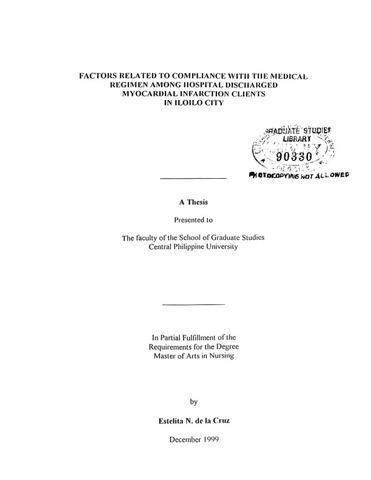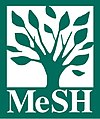Factors related to compliance with the medical regimen among hospital discharged myocardial infarction clients in Iloilo City
요약
This study determined the factors related to compliance with medical regimen to medication, diet and exercise. The factors examined in relation to compliance include: myocardial infarction clients’ personal characteristics, severity of their illness, their functional capacity, and their compliance with medication, diet and exercise.
The subjects of this study consisted of 56 randomly chosen myocardial infarction clients who were admitted and discharged from two hospitals in Iloilo, the government and private hospitals from January 1998 up to December 1998.
This study used the descriptive-correlational research design. Data were collected through personal interview using a structured interview. The researcher conducted the interviews herself. The data were processed and analyzed using the statistical package for the social sciences (SPSS+). Appropriate statistics were used in the analysis of relationships and description.
Major bindings
1. The majority of the respondents were male, married, were between 61-80 years old, most had attained college education and with monthly income of less than P5,000.
2. Almost half of the respondents (48.0 percent) had class II or moderate MI.
3. A little more than half of the respondents (56.0 percent) performed their physical activities without experiencing angina, dyspnea, and fatigue.
4. The majority of the respondents took their prescribed medications, ate the kind and amount of food to them, and performed exercises prescribed by their physician.
5. Their respondents’ compliance with medication regimen significantly varied according to the sex of respondents. The male patients were more likely to comply with their medication regimen than the female patients.
6. There is a low, but significant association between civil status of the respondents’ and their compliance with medication regimen. The single respondents had better compliance with medication regimen than those who were married.
7. There is a significant moderate relationship between the respondents’ income and their compliance with medication regimen. The respondents with higher income tended to have better compliance with medication regimen than those patients with lower incomes.
8. There is a significant high relationship between patients’ educational attainment and their compliance with medication regimen. Respondents with college education tended to have better compliance with their medication regimen than those patients with lesser educational attainment.
9. Patients’ compliance with dietary regimen was not significantly related to age, sex, civil status, income, educational attainment, severity of illness upon admission and functional capacity upon discharge from the hospital of the patient.
10. Patients’ compliance with exercise regimen was not significantly related to age, sex, civil status, income, educational attainment, severity of illness upon admission and functional capacity upon discharge from the hospital of the patient.
Conclusions: In the light of significant findings of the study, the following conclusions are drawned:
1. Male patients are more likely to comply with medication regimen than those female patients.
2. Single respondents tend to have better compliance with medication regimen than those married patients.
3. Respondents who had higher income are more likely to comply with medication regimen than those patients who have lower income.
4. Patients who had higher educational attainment are more likely to comply with medication regimen than those patients who had lesser educational attainment.
5. Respondents’ compliance with dietary regimen does not vary with the age, sex, civil status, income, educational attainment, severity of illness and functional capacity of the patient.
6. Respondents’ compliance with exercise regimen does not influenced with the age, sex, civil status, income, educational attainment, severity of illness and functional capacity of patient. Recommendations:
Considering the significant findings and the conclusion derived from the study, the investigator presents the following recommendations:
1. Taking of prescribed medication regularly should be given emphasis by doctors to comply with their medication regimen. Patients should also be instructed to religiously take their medications to improve their health condition, since it is vital in prolonging survival and improving their quality of life. It is therefore recommended that government and non-government organizations should further intensify their information dissemination in the prevention and control of cardiovascular diseases by increasing the community’s level of awareness about cardiovascular diseases and their causes.
2. Compliance with medication regimen should be encouraged to myocardial infarction patients. Family caregivers should be taught the importance of taking medications regularly so that they could assist guide and support the patients during their course of treatment Respondents should continue taking their medications in order to prevent the progression of the disease since they are also responsible for their own health and the health of their families. It is recommended that the patient’s family and the significant others should be provided with health education information for they are the direct caregivers of the patients.
3. The importance of taking medication is one of the cornerstones for recovery which should be understand so that patients should be encouraged to still continue taking their prescribed medications regularly to hasten recovery. It is therefore recommended that patient should adhere to the prescribe medical regimen since it is vital in prolonging survival and improving the patient’s quality of life and at the same time reduce complications.
4. The importance of taking medication should be encouraged to patients who were less-educated. Patients who were well-educated should be encouraged to still continue complying with their proper medication regimen. They should also be instructed to watch for effects and side effects of each medications taken like nausea and vomiting, headache, blurred vision and seek medical treatment immediately if this should arise. It is therefore recommended that secondary prevention should be emphasized to myocardial infarction patients in order to prevent the progression of the disease. Early detection, diagnosis and treatment of the illness should be done to limit the occurrence of permanent disability.
5. Exercise plays a role in minimizing disability. Participation of myocardial infarction patients in exercise training programmes can improve their functional capacity and reduce myocardial workload, thus, decreasing disability. It is further recommended that myocardial infarction patients after discharge from the hospital should continue to perform exercises and participate in homebased walking program and should have a daily routine of exercise since it is valuable and economical strategy that facilitates early recovery.
6. Patients should control their diet by reducing their intake of saturated fat and cholesterol. The use of refined sugar should be limited and the use of excess salt and to regulate alcohol intake of not more than 60 ml/day in order to maintain body weight within normal limits and reduce potential accumulation of fat deposit. It is further recommended that myocardial infarction patients should have a dietary program and to keep a record of his/her baseline height and weight, and monitor the progress of his/her dietary program. The use of natural carbohydrates, fish, poultry, legumes, fruits, vegetables and grain in the daily diet will enhance well-balanced nutrition.
기술
Abstract only
추천 인용
De la Cruz, E. N. (1999). Factors related to compliance with the medical regimen among hospital discharged myocardial infarction clients in Iloilo City (Unpublished Master's thesis). Central Philippine University, Jaro, Iloilo City.
유형
Thesis주제
키워드
학과
School of Graduate Studies정도
Master of Arts in Nursing선반 위치
GSL Theses 610.73072 C889
물리적 설명
xviii, 88 leaves




